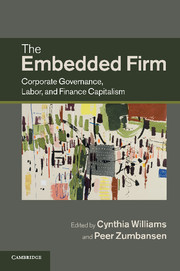Book contents
- Frontmatter
- Contents
- Figures
- Tables
- Contributors
- 1 Introduction: corporate governance after the ‘end of history’
- Part I Historical trajectories of business and regulation
- 2 Corporate governance and financial crisis in the long run
- 3 Financialism
- 4 Legitimating power
- 5 Engaging corporate boards
- 6 The primacy of Delaware and the embeddedness of the firm
- 7 The new embeddedness of the corporation
- Part II New interests, new shareholder constellations, new landscapes
- Part III Labor’s evolution in the new economy
- Part IV The transnational embedded firm and the financial crisis
- Part V Conclusion
- Index
- References
3 - Financialism
a (very) brief history
from Part I - Historical trajectories of business and regulation
Published online by Cambridge University Press: 07 September 2011
- Frontmatter
- Contents
- Figures
- Tables
- Contributors
- 1 Introduction: corporate governance after the ‘end of history’
- Part I Historical trajectories of business and regulation
- 2 Corporate governance and financial crisis in the long run
- 3 Financialism
- 4 Legitimating power
- 5 Engaging corporate boards
- 6 The primacy of Delaware and the embeddedness of the firm
- 7 The new embeddedness of the corporation
- Part II New interests, new shareholder constellations, new landscapes
- Part III Labor’s evolution in the new economy
- Part IV The transnational embedded firm and the financial crisis
- Part V Conclusion
- Index
- References
Summary
The United States no longer is a capitalist country. It has created a new economic system that appears to be capitalist but no longer performs the functions of capitalism. Capitalism is a system in which wealth is created and sustained by the production of goods and services determined through market supply and demand. A variety of related structures support capitalism, including the institutions of finance, which provide the funds necessary for the production and trade of goods and services.
While capitalism still characterizes a portion of the US economy, it has become subordinated to a new economic order. This economic system is one in which the financial markets exist primarily to serve themselves. In this system, capital is raised for the purpose of creating, selling and trading securities and derivative securities that do not finance industry but rather trade within markets that exist as an economy unto themselves. At the same time, those markets have profound and adverse effects on the real economy. This new economic system is Financialism.
- Type
- Chapter
- Information
- The Embedded FirmCorporate Governance, Labor, and Finance Capitalism, pp. 42 - 59Publisher: Cambridge University PressPrint publication year: 2011
References
- 4
- Cited by



